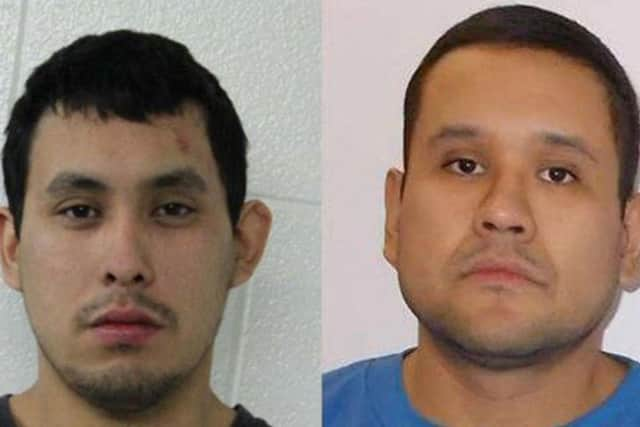Canada stabbings: Community rocked by stabbings as one suspect found dead
The stabbings, which targeted a total of 25 people, killing ten, took place on the James Smith Cree Nation, a First Nation’s community, as well as the nearby village of Weldon, which is home to fewer than 200 people.
James Smith Cree Nation is also a small, close-knit community, with a population of around 2,400 people.
Advertisement
Hide AdAdvertisement
Hide AdResidents described two men forcing their way into their homes on Sunday afternoon before fleeing in a stolen car. Police have said while some victims appeared to be targeted, others were random. Shockwaves have spread throughout the Saskatchewan community.


“They were our relatives, friends – mostly we’re all related here, so it’s pretty hard, it’s pretty horrific,” Calvin Sanderson, one of the elected leaders of the three indigenous communities which share the reserve, told local newspaper the Regina Leader Post.
In a video address, Evan Bray, chief of police for the Regina police service, pledged to work tirelessly until the men, Damien and Myles Sanderson, were in custody.
"And so efforts continue,” he said. “We've got a fresh set of investigators and shifts coming in today.
"There's a lot of grief. There's a lot of anxiety in our province and in our communities this morning and all day yesterday. And really I think an important step for families and communities working through this will be to bring these two safely into custody.”
One of the suspects in the killing of 10 people in a series of stabbings has been found dead, and his injuries are not self inflicted, Canadian police have said.
They said his brother, also a suspect, may be injured and remains on the run.
Regina police chief Evan Bray said Damien Sanderson, 31, had been found dead and that they believe Myles Sanderson, 30, is in Regina, Saskatchewan.
Advertisement
Hide AdAdvertisement
Hide AdThe men are understood to have taken a car, a black Nissan Rogue, from one house in James Smith Cree Nation, before driving away. Reports initially claimed the two men had split up, but later statements from police indicated they believed they were still together.
Police said on Monday that a vehicle reportedly carrying the two suspects had been spotted in Regina, 208 miles south of the communities where the stabbings occurred.
Canadian Prime Minister Justin Trudeau expressed his concern about the stabbings in Saskatchewan, describing them in a tweet as "horrific and heart-breaking".
One of the victims, Earl Burns Sr, was described on social media as “a good family man with a kind heart and a warm smile”. He was understood to have been a school bus driver for a number of years. Another, Lana Head, was the mother of two daughters. She was killed alongside her partner.
A third victim, named as widower Wes Petterson, 77, was described as being “like an uncle” to local resident Ruby Works.
“He didn't do anything, he didn't deserve this – he was a good, kind-hearted man,” said Ms Works, from Weldon, which is home to many descendants of original Norwegian settlers who first established the community just after the turn of the 20th century.
She added: "No-one in this town is ever going to sleep again. They're going to be terrified to open their door."
Community leader Aly Bear wrote to members of the community in James Smith Cree Nation and the other two indigenous communities which share the reserve, warning violence was “systemically embedded from colonial violence to lateral violence” in the local community.
Advertisement
Hide AdAdvertisement
Hide AdHe said: “Today is a challenging day. I send my deepest condolences to the families of the lives that were taken too soon.”
Mr Bear added: “It is one thing to address the harms done to us and our peoples, it is another to find solutions from these tragedies. I, alone, do not have it all figured out. However, I know there are places where which we should begin, and I will ensure it comes from our inherent Indigenous values and laws of honesty, wisdom, courage, respect, truth, humility and love.”
Canada's homicide rate is around twice that of the UK, according to data from the World Bank. However, it is far lower than that of the neighbouring US and major violent incidents are rare.
A report published in 2019 by Statistics Canada found First Nations communities were far more likely to be murdered than other Canadians. Of 651 murders in 2018, 140 – 22 per cent – were of Indigenous people, despite them totalling just 5 per cent of the population.
A deepening crisis has occurred in Indigenous communities in recent years, with communities speaking out against their treatment by authorities over decades. Drug use is high in some Indigenous communities, while in some provinces, reports have claimed more than 60 per cent of indigenous children live in poverty.
Earlier this year, Archbishop of Canterbury Justin Welby visited the James Smith Cree Nation community to apologise for the Anglican church’s role in abuse and trauma suffered by First Nations children in residential schools in Canada.
Between 1820 and 1969, the Anglican Church ran around three dozen residential schools in Canada, and also ran more than 150 Indian day schools, according to a list compiled for the Federal Indian Day School class action. The schools have been accused of systematically undermining Indigenous, First Nations, Métis and Inuit cultures across Canada and disrupting families for generations.
Survivors of the schools have testified that children who died at the schools were buried in unmarked plots, many of which have been rediscovered throughout the country in recent years.
The Anglican Church apologised for its role in residential schools in 1993 and in 2019. It has also paid $15.7 million (£10.3m) in compensation.
Comments
Want to join the conversation? Please or to comment on this article.
